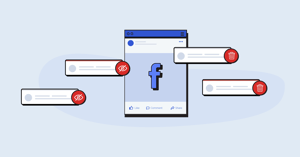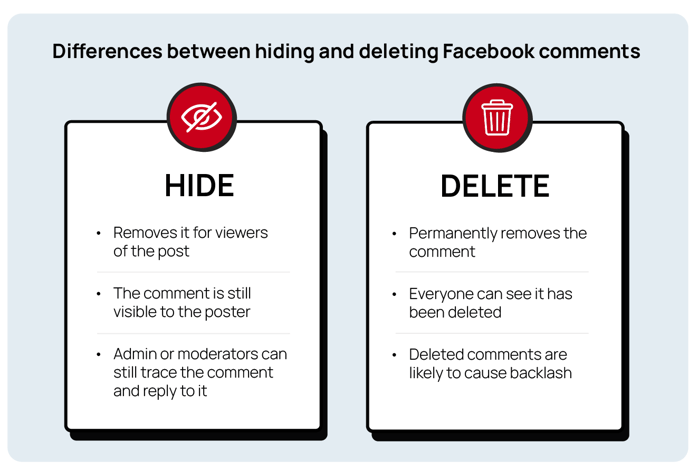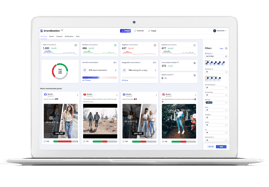
Why You Should Hide Facebook Comments and Not Delete Them
Here’s Why Hiding Comments on Social Platforms is a Better Move
There are a lot of things that can end up on your social media ads that are damaging. Rude comments, offensive comments, and competitor promotions are some of these things. Marketers know that their Return on Ad Spend (ROAS) is largely dependent on how they manage and moderate user engagement.
But once you’ve identified a damaging comment, what do you do? Hide versus delete it? Is there really a difference, so long as the comment is gone from the general view?
The answer is yes, there is a big difference between hiding versus deleting comments on Facebook and other social networks. Delete a comment, and it’s gone forever. No one (including the initial poster) will ever be able to access it again. However, when you hide a comment on Facebook, you’ve successfully removed the damaging content from public view without permanently (and noticeably, from the initial poster’s perspective) erasing this interaction.
Our team always recommends brands take the hide action. In this article, we’ll take a look at the reason why we don’t delete comments and the benefits that hiding brings to brands and their ads.
What Happens When You Delete A Comment On Facebook?
Naturally, users react badly when they notice brands deleting their comments.
The importance people place on free speech on social media is a funny thing. Often, the fear of negative backlash from removing a comment is what keeps brands from active content moderation.
The first thing to get out of the way is the misconception that all forms of moderation are an infringement on free speech. Hiding comments on Facebook or other social media platforms doesn't pit your brand against free speech. According to a recent survey by USA Today-Suffolk University, 52% of Americans believe platforms have an obligation to remove hate speech from social media.
This said, it’s human nature to react badly to seeing something you’ve said censored. 49% of Americans do believe that it’s a free speech violation when social media users are banned based on their comments. When a user notices a brand has deleted their comment, it’s common for the situation to quickly spiral out of control. The now enraged user then starts posting many times about the perceived offense. The worst part is that they use increasing levels of harmful language and negativity. When this happens, you’ve turned a single harmful comment into a stream of vitriol that takes over your advertising.

Hiding vs Deleting Comments on Facebook?
What happens when you hide a comment on Facebook?
As explained by Facebook, “When you hide a comment from a post on your Page, the comment will only be visible to the person who wrote it and their friends. When you delete a comment from a post on your Page, the comment will be permanently removed from the post.”
Will someone know if I deleted their comment on Facebook?
Across all social media channels, savvy users can tell when you delete one of their comments. But users are much less likely to notice when something has been hidden, thanks to the simple fact that they can still see the comment when logged in. Of course, who exactly can see hidden comments does vary from platform to platform.
If a user can’t tell that their harmful comment has been removed, they’re much less likely to take over advertising with damaging comments and negativity. That alone is a reason always to opt to hide versus delete comments on Facebook.
Brand Benefits of Hiding vs Deleting Comments on Facebook
1. Resolving Customer Complaints and Increasing Purchase Intent
As brands determine what content they’d like to leave visible on their ads, there are a few categories and situations that can lead to sticky situations. One of the biggest is customer complaints.
An ad that’s taken over by customer complaints is going to see a dip in its effectiveness due to a drop in user perception.
According to GlobalWebIndex, 54% of users use social media to research products and 71% are more likely to purchase products and services based on social media referrals. And In a recent report, it was found that 62% of users look to user-generated content like comments to advise their purchase decisions on social media. So, ads that see too many negative comments and complaints (even when your brand addresses them) run the risk of damaged user perception and diminished Return on Ad Spend (ROAS).
At the same time, when users post a complaint on social media, they’re expecting a response (and they want it within 24 hours). According to Microsoft’s 2018 State of Global Customer Service Report, 59% of global consumers have a more favorable impression of brands that tackle customer service issues on social media. Deleting complaints does the exact opposite of this. Whether you intend to or not, it signifies to the posting user that you care so little about their problem that permanently erased it. And that’s a bad look.
How hiding versus deleting helps: Fortunately, brands can leverage the hide feature to get the best of both worlds. By hiding (and not permanently deleting) comments on Facebook, such as customer complaints, brands can keep their ads relatively free of comments that may damage user perceptions while also responding to upset users at the same time.
On platforms like Facebook and Instagram, when you hide a comment on Facebook, you also hide all the threaded responses. Doing this allows your customer care team to reach out to the user discretely and continue the conversation without distracting the ad’s general audience.
2. Managing Potential PR Disasters
Another area where the hide feature’s ability to keep the comment accessible (and the channel of communication with the user open) is handling reports of potentially extreme events. These are comments from users who take to social media to report having been harmed by a brand, its products, or its services.
Comments about theft, allergic reactions, employee misconduct, etc. are every social marketer’s nightmare because, if picked up by the media or ill-managed, the accusation (whether true or not) of your brand having done harm can spiral into a PR frenzy.
It’s essential for companies to have mechanisms to investigate extreme allegations to determine the correct course of action. But you can’t do this if you delete the comment accusing one of your employees of theft – it’s gone, the lines of communication between your brand and the user have been shut down, and there’s a really good chance the user will notice and repost.
How hiding versus deleting helps: By hiding harmful comments on Facebook, you give your internal team the chance to investigate the situation privately. If you need to follow up with the user for more information, none of the details and lines of communication are lost.
To Hide Or Delete Comments on Facebook: Key Takeaways
In our opinion, it’s always better to hide a comment on Facebook than delete it, because “delete” is an irreversible and noticeable action that social media users react badly to.
Often, deleting damaging comments does more harm because:
| ❌ | The user is infinitely more likely to see they’ve been censored and grow angry. It has huge potential to turn one damaging comment into a rant from an enraged user that’s taken over your advertising. |
| ❌ | All information contained in the comment is lost, making it much more difficult for brands to look into situations and take follow-up action if required. |
| ❌ | That connection with the user is permanently severed. For managing customer complaints and reports of potentially extreme situations, your brand will not be able to continue the discussion unless the user reaches out again. |
On the other hand, hiding comments is a discrete, elegant solution that offers the following advantages:
| ✅ | The user is unlikely to notice the comment has been hidden as they still can see the comment. One nuance to this is the question of whether their friends can see a hidden comment, which varies between platforms. On Facebook, a user’s connected friends can still see their comment(s) even if it has been hidden. On Instagram, only the user but not her followers, can see hidden comments. |
| ✅ | Your internal team can still trace the comment and either reply directly within a hidden thread or reach out via Messenger or another private channel to address any dissatisfaction or resolve an issue. |
Curious about how BrandBastion can help you get started with social media moderation? Read more about our platform and start a 15-day free trial:
Social media moderation made easy
Facebook, Instagram, Youtube, TikTokAds & Organic covered (including FB Dynamic Ads)
START FREE TRIAL
